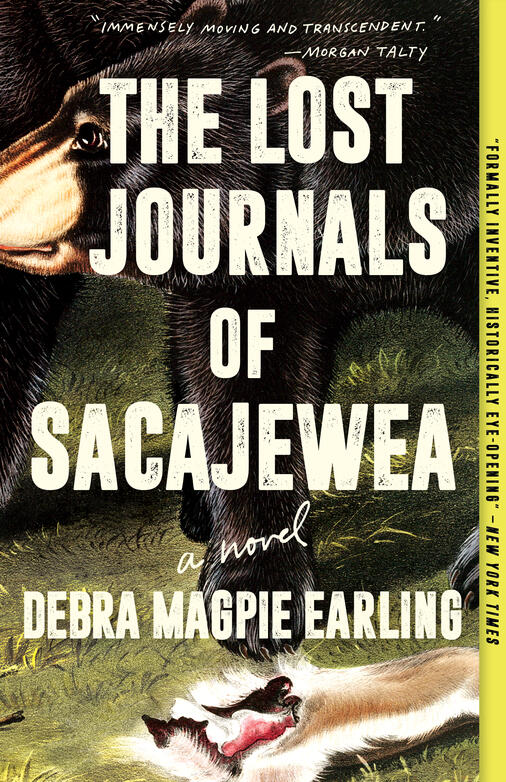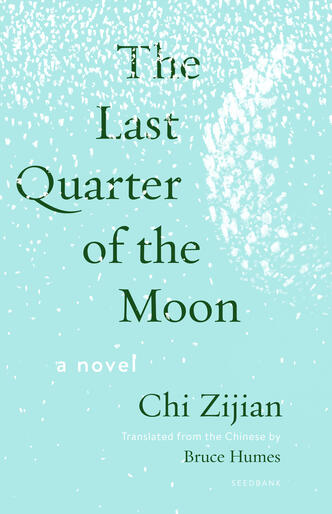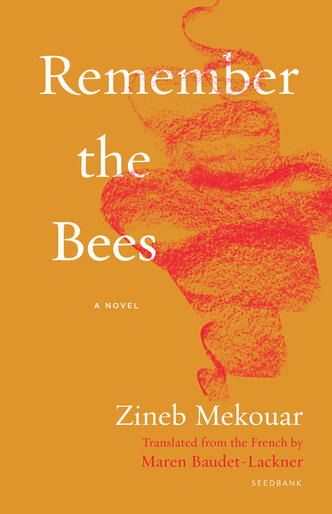
The Lost Journals of Sacajewea
“A formally inventive, historically eye-opening novel.”—NEW YORK TIMES
Winner of the 2024 American Book Award
Winner of the Montana Book Award
Winner of the Pacific Northwest Book Award
An Indie Next Pick, selected by booksellers
“In my seventh winter, when my head only reached my Appe’s rib, a White Man came into camp. Bare trees scratched sky. Cold was endless. He moved through trees like strikes of sunlight. My Bia said he came with bad intentions, like a Water Baby’s cry.”
Among the most memorialized women in American history, Sacajewea served as interpreter and guide for Lewis and Clark’s Corps of Discovery. In this visionary novel, acclaimed Indigenous author Debra Magpie Earling brings this mythologized figure vividly to life, casting unsparing light on the men who brutalized her and recentering Sacajewea as the arbiter of her own history.
Here, the young Sacajewea is bright and bold, growing strong from the hard work of “learning all ways to survive.” When her village is raided, Sacajewea is kidnapped and then gambled away to Charbonneau, a French Canadian trapper. Heavy with grief, she learns how to survive at the edge of a strange new world. When Lewis and Clark’s expedition party arrives, Sacajewea knows she must cross a vast and brutal terrain with her newborn son, the white man who owns her, and a company of men who wish to conquer and commodify the world she loves.
Written in lyrical, dreamlike prose, The Lost Journals of Sacajewea is an astonishing work of art and a powerful tale of perseverance—the Indigenous woman’s story that hasn’t been told.
Like this book? Sign up for occasional updates
Related Media

Debra Magpie Earling
Debra Magpie Earling is the author of Perma Red and The Lost Journals of Sacajewea.
Praise and Prizes
-
“A formally inventive, historically eye-opening novel.”
New York Times -
“[In The Lost Journals of Sacajewea] the suffering—and bold, ingenious agency—of women held as captives by both Native and Euro-Americans is rendered with special vividness […] The narration is rich in realistic detail but animated by a dreamlike intensity […] Throughout the text, Sacajewea memorably enacts what Gerald Vizenor dubs survivance, the negotiation of existential challenges with a spirited, oppositional inventiveness. A profoundly moving imagining of the impressions and contributions of a major historical figure.”
Kirkus Reviews, starred review -
“Earling adds a much-needed Native woman’s perspective to Sacajewea’s story, bringing a note of resilience to her unflinching account of the white men’s violence and depredation: ‘Women do not become their Enemy captors. We survive them.’ This is a beautiful reclamation.”
Publishers Weekly -
“Earling ‘shatters’ conventional form to create a movement that is akin to poetry but much more dynamic. Earling bends and slants words, electrifying Sacajewea’s attempts to comprehend and describe what is happening in her often violent and unstable world .[ …] Earling creates immersive landscapes where women like Sacajewea and Louise Yellow Knife [from Perma Red] are given an opportunity to speak; she writes with distinct, unflinching attention even as her characters suffer brutal physical and sexual violence.”
Maggie Neal Doherty, High Country News -
“[The Lost Journals of Sacajewea] offers new perspective on what is known, and debated, about the life of Sacajewea, including her age, her marriage to a French fur-trader (Toussaint Charbonneau), and her experience as the only woman traveling on the 1804-1806 Corp of Discovery expedition with Meriwether Lewis and William Clark. In poetic prose, Earling interweaves factual accounts of Sacajewea’s life with a first-person narrative deeply rooted in the physicality of landscape and brutality of the times.”
Jessica Gigot, Seattle Times -
“The most remarkable thing about The Lost Journals of Sacajewea is how uncompromising it is in its vision of a precolonial consciousness. […] Through Sacajewea’s voice, Earling rejects traditional English narrative forms as well as the sanitized version of westward expansion. Sacajewea’s words never delineate between her mind and her body, between people and the natural world around her, between the present and the eternal, between prose and poetry—dualities westerners and Western literature take for granted. As a result, the novel records a life story that at once feels representative of the historical violence indigenous women have faced and survived, but also a life story burdened by a place in popular history that is not Sacajewea’s, was never meant to be hers.”
Carlos Zayas-Pons, Sewanee Review -
“A much-anticipated and gorgeous book from Debra Magpie Earling. The Lost Journals of Sacajewea is immersive and engaging, drawing the reader into a new way of seeing what we think we know of the story of Sacajewea.”
June 2023 Indie Next ListMara Panich, Fact & Fiction, Missoula, MT -
“[The Lost Journals of Sacajewea is] an impressionistic, poetic account, one that vividly renders external hardships and internal thoughts, giving equal weight to each. […] it delivers a uniquely thorough perspective on the mind of a particular young woman, both ordinary and extraordinary. In this way, we come to understand Sacajewea more deeply—certainly more than we understand the men of famous names like Lewis and Clark. lt’s a book to enjoy like a river: you give yourself over to it and follow where it takes you.”
Greer Macallister, Chicago Review of Books -
“Earling’s Sacajawea rewrites the version of herself handed down through American history. Her life before the expedition comes into vivid focus, as do her complicated feelings about her role in charting the course for American imperialism.”
The MillionsMost Anticipated Books of 2023 -
“[Earling’s] lyrical novel brings this mythologized figure [Sacajewea] to life, casting unsparing light on the men who brutalized her and recentering Sacajewea as the arbiter of her own history, which is, ultimately, one of survival. [Earling’s] book is a tool of and for empathy, not so much one of understanding each word or experience, but of feeling.”
Lauren CornThe Write Question -
“At its surface, this may be a novel, but deeper down, it’s a spirit- song, an invocation, a magical incantation. The language simultaneously keeps Sacajewea unknowable and gives us a path to greater understanding. The poetic prose elevates it from a tragic story to a founding mythic ethos of America. In this, Earling has given us a new model for the literature of the West. The Lost Journals of Sacajewea changes how novels will be written, or at least it should.”
Marc Beaudin, Big Sky Journal -
“[The Lost Journals of Sacajewea] brings long-overdue reclamation to storytelling for Native voices everywhere.”
Motherly -
“We all know the story of Sacajewea from the perspective of Lewis and Clark, but Earling reframes the narrative around Sacajewea’s voice.”
Garden & Gun -
“An Indigenous author redefines the legacy of Sacajawea, the famed Shoshone guide and translator for the Lewis and Clark expedition.”
Pittsburgh City Paper -
“This is easily one of the best works of literature this year. I loved it. In beautiful, impressionistic chapters that flow between prose, prose poetry, and poetry, Debra Magpie Earling centers Sacajewea in her own, vibrant world.”
Jennifer Martin, Tattered Cover, Denver, CO -
“This book may be classified as a novel, but it arguably does more justice to Sacajewea’s story than many of the sanitized historical recounts of her life—not hiding the fact that she was stolen, sold, brutalized, and pregnant, all before the age of twelve. Earling wrote The Lost Journals of Sacajewea for the bicentennial of the Lewis and Clark expedition, now finally published in book form to read worldwide. Essential for any American History reader.”
Andrew King, Secret Garden, Seattle, WA -
“If the Olympics awarded medals for feats of the imagination, this book would be good for the Gold. Marvelously dreamed, starkly and poetically told. The story of the Lewis and Clark Expedition will never be the same.”
Ted Kooserauthor of Delights and Shadows -
“Debra Magpie Earling’s gorgeous retelling of Sacajewea’s journey shatters modern-day narrative conventions and documented history. With mesmerizing language and incantatory rhythms, Earling delivers an urgent accounting from the true world in a work that feels more alive than written. Yes, alive in a way I didn’t recognize—yet still felt! How deeply, deeply I fell into this story. The bottom line is that The Lost Journals of Sacajewea is an awakening, a revelation, a devastating triumph, and a literary magic act.”
Adrianne Harunauthor of A Man Came Out of a Door in the Mountain -
“The Lost Journals of Sacajewea is a wonder! Earling reclaims Sacajewea from non-Native histories and characterizations and restores the fulness of her being. She unflinchingly depicts the complexities of a girl navigating layers of trauma, yet preserves Sacajewea’s agency and power. Earling’s Sacajewea tells us a new story, closer to the bone. In gorgeous, startling, revelatory prose, the author commands the English language in profound ways, shapes it to her purposes, and designs a new speech. The Lost Journals of Sacajewea is a literary masterpiece, a whirlwind of a story that made me shiver in response to its difficult beauty.”
Susan Powerauthor of Sacred Wilderness -
“The Lost Journals of Sacajewea is a masterpiece, not just of historical fiction, but of any genre. This raw and bracing retelling of Sacajewea’s life is a thorough dismantling of the legend of the Corps of Discovery, to be sure. But in line after stunning line, Earling reveals Sacajewea in an astonishing and heartbreaking fullness. This sublime book will leave you shook and touched at once, on every single page.”
Smith Hendersonauthor of Make Them Cry -
“Not since James Welch’s monumental Fools Crow has such an immersive work of narrative genius risen out of the West. In luminous, image-laden prose, as if by way of elemental reconstitution, Debra Magpie Earling awakens a voice that our American mythology had hoped would stay sleeping, and in so doing unearths The Lost Journals of Sacajewea, a harrowing—though ultimately triumphant—once-in-a-generation work of art.”
Chris Dombrowskiauthor of The River You Touch -
“The Lost Journals of Sacajewea is an immensely moving and transcendental work of literature. Debra Magpie Earling masterfully tells a story with prose so determined and so full of light and beauty that it’s impossible to look away. This is a striking, elegant, and impressive work of art that persists in the reader’s mind even after the book has ended.”
Morgan Taltyauthor of Night of the Living Rez
You Might Enjoy
Bold, passionate, and more urgent than ever, Debra Magpie Earling’s powerful classic novel is reborn in this new edition.
“Shrewd, sage, and so darkly funny.” —Claire Lombardo, author of The Most Fun We Ever Had
An unsuspecting couple is treated to a luxury vacation by their deceased neighbor. After begrudgingly agreeing to volunteer at a nursing home, a middle school…
In an ancient Moroccan apiary, a young boy’s inheritance of bees is endangered by climate change, family secrets, and the silence surrounding grief.
High in the Atlas Mountains of Morocco, surrounded by valleys once rich with lavender and thyme…
A Library Journal Best Book of 2025
A Lit Hub Most Anticipated Book of 2025
A Kirkus Starred Review
An irreverent, darkly comic novel dissecting the misjudgments, hypocrisies, and occasional good motives that drive our politics and our journalism, as…
Debra Magpie Earling on surfacing through silence: “The time is now.”
Debra Magpie Earling wasn’t exactly surprised when her first novel, Perma Red, was banned after its re-release in 2022…
March book club at Milkweed Books

Please join Milkweed Books for our March Book Club with Perma Red by Debra Magpie Earling.
Booksellers will lead…













